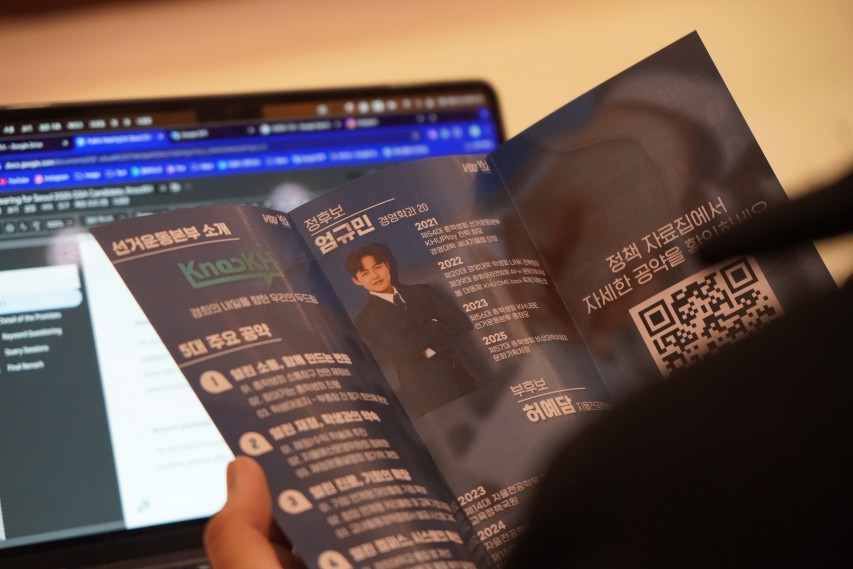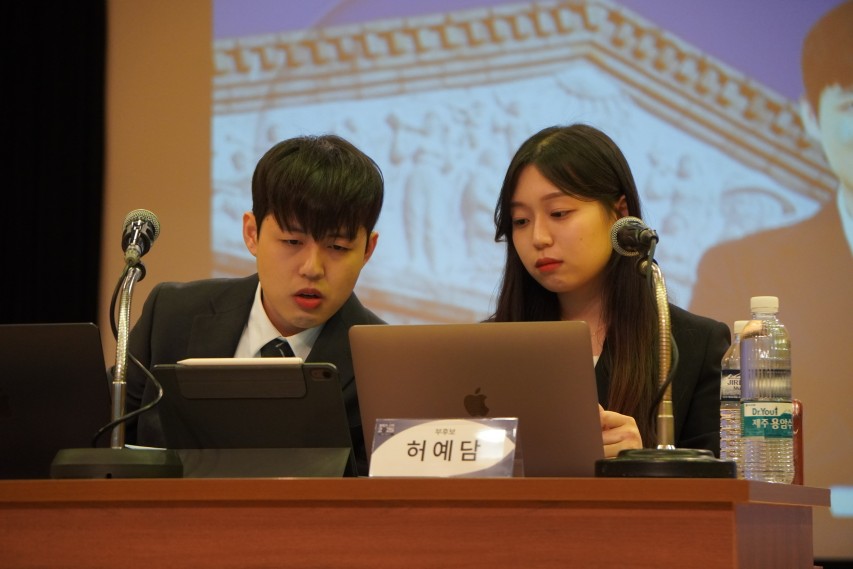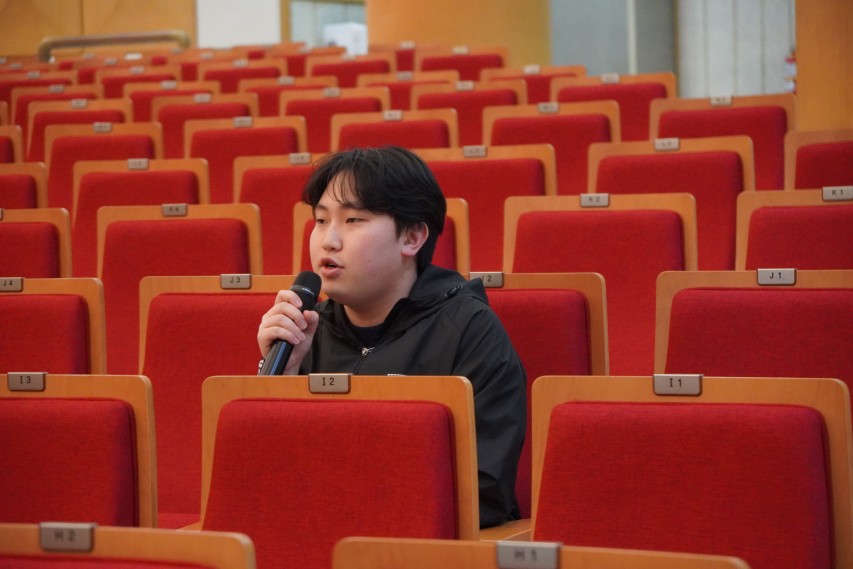[Campus] Public Hearing for Seoul Campus 2025 GSA Candidate, KnocKH
The public hearing for the Seoul Campus 2025 GSA election was held on March 19 at 18:30 in the Crown Concert Hall. The session included the candidate’s promise explanation, keyword questioning, media queries, participant queries, and the candidate’s final remark. This session provided Kyung Hee University (KHU) students with a clearer understanding of the candidate’s promises and vision before they cast their votes.
2025 Seoul Campus GSA by-election banner |
Photo by Lee, Su-in / The University Life |
Detail of the Promises
The sole candidate, KnocKH, opened the session by explaining its election promises. They raised 32 specific promises under eight categories: university affairs, student rights, culture, communication, welfare, facility safety, career development, student autonomy and foreign students.
Among these, KnocKH highlighted 14 core promises under five categories during the hearing session. In the communication sector, key promises include renovating the GSA website, enhancing communication with KHU students, and holding regular meetings with student representatives and the University vice-president.
In the financial sector, they remarked on organizing a finance/revenue academic forum to enhance budget transparency and holding an Autonomous Budget Management Committee and Financial Operation Briefing Session.
They also outlined their plans for career development opportunities. Their promises include offering corporate-linked extracurricular activities or entrepreneurship-linked curriculum and educational opportunities. Additionally, certificates for experience in school activities were established.
Improving KHU’s digital and administrative service systems is another core value of KnocKH. The promises in this category include improving the newly launched integrated app, integrating the campus facility and equipment reservation system, and establishing an in-house enrollment certificate issuing system.
The final key area is improving education quality. Their plans include alleviating evaluation standards for elective courses and specifying the number of students registered on the preferred course selection system for each grade.
KnocKH is preparing for answering |
Photo by Lee, Su-in / The University Life |
Keyword Questioning
The next session was the keyword questioning segment. The candidate shared their own thoughts on four keywords: university affairs, finance, convergence, and sustainability, which had not been disclosed to them in advance.
The first keyword, university affairs, KnocKH expressed their perspective: “We hope the university affairs can reflect as many of students’ ideas as possible. This is why we made a promise to adjust the way of elective course scoring to absolute evaluation, stemming from the past GSA Sketch. Moreover, we recognized that many students were uncomfortable with course selection, leading us to improve the course selection system.”
The second keyword was finance. The candidate stated that the most critical issue in this area is tuition fee increase, emphasizing the need for discussion on prior ways of usage and preventing future hikes. They added, “We will encourage students to actively discuss budget-related issues, which is why we drew the promises about budget management.”
Regarding the third keyword, convergence, they highlighted its importance in a university community where diverse individuals come together. They explained that their carer development promises align with this principle. Additionally, as their key goal is uniting students’ voices in harmony, festival-related promises are related to his value.
The last keyword, sustainability, KnocKH acknowledged its significance, noting that promises made by past GSAs often tend to disappear over time. They stated that they are exploring ways to develop a system that will remain in place even as the GSA changes. Furthermore, they are considering establishing various meetings and certificate-issuing processes that will remain in place even after their term ends.
Query Sessions
The query sessions provided questioning opportunities for KHU media and student participants. For media queries, three KHU media outlets—The University Life, Daehak Jubo, and Voice of University (V.O.U.) Seoul branch—took an hour of the questioning session. Each media outlet was allocated 10, 25, and 25 minutes, respectively, posing 4, 13, and 10 questions to KnocKH. The details of the media query session are published in separate news articles by The University Life and Daehak Jubo.
The participant query session followed, in which three students posed questions to the candidates. Kim Yoo-kyung, a student from the Dept. of Political Science and International Relations, inquired about solutions for issues related to convergent majors, such as a lack of courses or difficulties in course selection. KnocKH responded, “We will put more effort into promotion to increase student awareness of convergent majors. They added, “Ultimately, we aim to empower students to bring uniqueness to their studies and shape their academic path.”
Lee Su-in, a student from the Dept. of Applied English Linguistics and Translation Studies asked whether KnocKH planned to improve communication methods for foreign students, as they often struggle to access information. KnocKH stated, “If KHU’s foreign students are facing information gaps, we will have more conversations with General Affairs of International Students. Moreover, we will explore ways to reach the students through the most convenient platform for them.”
Kim Tae-jun, a student from the Dept. of Media, asked the last question. He raised worries that the student-led university might lead to excessive competition. KnocKH responded that while they have not yet structured the festival planning team, they will take this issue into consideration during the preparation process.”
Kim Tae-jun is asking a question |
Photo by Lee, Su-in / The University Life |
Final Remark
For the final remark, KnocKH reaffirmed its commitment to feasibility. They stated, “Beyond being just a channel for voices, we will turn these voices into reality. We will drive change through robust communication with students.”
They also emphasized that their vision can only be realized with the students. “Student autonomy cannot be achieved through GSA’s efforts alone; it requires students’ interest and participation.” They concluded by urging students to cast their votes to help shape KHU’s future.
Amid widespread indifference to university affairs, KnocKH appears poised to revive student autonomy at KHU. The candidate’s ability and ideas have been assessed during the hearing, leaving only one final step—voting. The voting will take place online from March 24 to 26, closing at 18:00.
There are no registered comments.
- 1
- 2
- 3
- 4
I agree to the collection of personal information.




